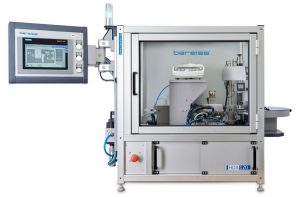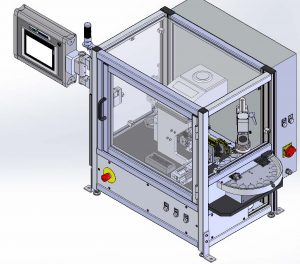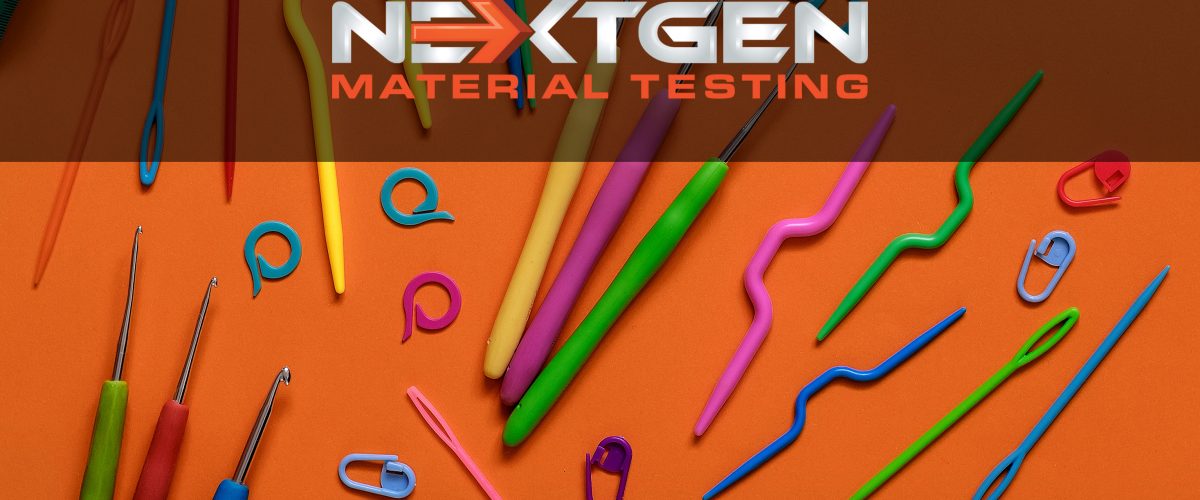Automated testing systems are becoming increasingly common in modern industry. Despite the fact that they are considerably more expensive than conventional manual instruments, many manufacturers prefer them for hardness testing because their efficiency is well worth the price. That’s why more and more manufacturers are investing in automated testing systems. Wondering why?
Introduction
Today, the Hardness and Density Automation Test System (HDA 120) is at the pinnacle of the technical evolution of instruments for plastic testing as well as rubber and other elastomers. Plastic density and hardness testing are important steps in the process of quality control of products and in determining the physical properties of materials for their selection for specific needs.

The state-of-the-art Hardness and Density Automation Test System (HDA 120) allows you to perform both tests automatically. This is a unique solution that combines a hardness testing system and a density test system in one instrument with the ability to perform sequential tests in automatic mode using up to 20 samples in one load. The combination of these two tests helps to provide a complete assessment of plastic quality.
The efficiency, accuracy, and reliability of the HDA 120 are ensured by the implementation of modern technology and quality assurance from a renowned German manufacturer. It is supplied and serviced in the North American market by NextGen. This equipment can be easily integrated into the infrastructure of a modern laboratory and can be combined with other processes using a universal Ethernet data interface. Automated testing minimizes operator influence on measurement processes, and therefore the errors in the data obtained that are associated with such influence.
Let’s find out more about the benefits of automatic testing systems below.
Automated Testing Systems for Hardness Testing
Automation test systems in manufacturing are essential for achieving production efficiency and quality. The accuracy of measurement here can have a key impact on the choice of material for production during the development of new products, as well as on the quality of certain batches of products during quality control. Reducing human intervention and errors is therefore one of the primary concerns that go away when deciding to invest in new automatic equipment such as the HDA 120. Automation of plastic testing equipment allows for the replacement of manual work by operators with automated processes. This reduces the influence of the human factor and the likelihood of errors that can occur due to fatigue, inexperience, emotional state or other factors. Mechanized and automated processes provide greater accuracy and repeatability of test results. Such equipment can reduce labor costs by requiring fewer operators to perform tests.
In addition, automated test systems such as HDA 120 allow you to perform many test cycles faster, more efficiently and without errors. Reducing the time it takes to run tests increases overall production productivity. This is especially important when you need to assess the quality of production in large quantities or adhere to tight production schedules. The processing of large amounts of data can also be greatly facilitated by the use of appropriate software. This makes it possible to detect even minor defects, deviations from standards, or negative trends in test results and improve production quality in a timely manner.
Thus, automation test systems have a positive impact on quality, productivity and has a positive economic effect.
Let’s find out how the HDA 120 performs in plastic hardness and density testing.
Easy Testing With the Hardness and Density Automation Test System (HDA 120)
The equipment has been engineered to provide maximum user-friendliness in the use of the hardware and software of the system. This approach allows the average operator to quickly learn the standard operating procedures of HDA 120 that make it possible to obtain reliable sample data time after time.
During the measurement process, the operator places standard shaped samples made of plastic, rubber or other elastomers in special cells of the built-in rotating table, where they are securely fixed by a pneumatic system. Up to 20 such samples can be loaded and moved one by one into the insulated working cabinet, where they are tested for hardness and density in sequence. The walls of the cabinet are made of transparent material, so that all stages of the testing process can be easily observed. The hardness test is repeated three times at different locations on the sample surface and can be performed according to the IRHD N (DIN ISO 48-2) or Shore A (DIN ISO 48-4) standards. During the hardness test, the specimens are securely clamped to the rotary table, which ensures that even very sticky materials can be tested.
After the hardness data has been collected, the sample is immediately and automatically removed from the turntable cell by the gripper system and transferred to the density measuring module. This module is located in the same working space of the cabinet. It measures the weight of the sample in air and the weight of the sample in water. To do this, a beaker with a certain level of distilled water is pushed upwards and the sample is completely immersed in the water and then weighed.
To obtain reliable results, the weighing in water is repeated at least one more time to ensure that reproducible data is collected. The water level in the beaker is checked each time and adjusted if necessary. To obtain an accurate density value from these measurements, the temperature of the water in the beaker and the air in the cabinet is maintained at a predetermined level to within 0.001°C. After the measurement, the sample is forced out of the cabinet space and into a special tray by the gripper system, making room for the next sample.
HDA 120 Hardness Testing Process
Density testing with HDA 120 complies with ISO 2781, DIN EN ISO 1183-1, and ASTM D1817.
The measurement process is very fast, typically taking about 2 minutes per sample, which is an unattainable measurement speed for measuring instruments without combined hardness and density testing. However, this time can depend on the type of test and the number of repetitions set up. The HDA 120’s fast single plastic hardness testing takes just 10 seconds to complete, not including the time required for the operator to load the sample. This testing speed is only possible thanks to the automation of the measurement.

For safe operation, the HDA 120 is equipped with emergency stop buttons that can be used to terminate the process in the event of an overload or blockage. Measurement accuracy is also ensured by timely calibration procedures.
The system stores data on the date and time of measurement, sample code, operator name, temperature values, three obtained hardness values, sample weight in air and water, and sample density. System and data management is easy via the touchscreen. The HDA 120’s interface also allows for the processing and analysis of the data, making it possible to quickly draw conclusions about the quality of a given material or its suitability for the intended application.
Which Production Areas Benefit From Using the Hardness and Density Automation Test System HDA 120?
Plastic hardness and density parameters play an important role in many areas of manufacturing, from plastic bags to rocketry.
In the automotive industry, the accuracy of hardness and density testing of plastic components such as body panels, bumpers, and interior parts determines the safety and quality of vehicles. Here, the health and lives of vehicle users depend on compliance with quality standards. Given the huge number of automotive components made from different elastomers, professionals in the automotive industry will be able to fully appreciate the benefits of HDA 120. The aerospace industry manufactures sophisticated aircraft equipment that is used in harsh environments and subjected to high mechanical and thermal stress. You can learn more about aluminum extrusion process from our partners in their new blog. Therefore, it is extremely important to choose the materials used to create a particular component. This is achieved by measuring the mechanical properties of hundreds and thousands of candidate materials to make an informed choice.
The production of electronic devices, such as smartphones, computers or household appliances, also benefits. Accurate hardness and density testing ensures stable physical and mechanical stability of devices and high build quality, and increases competitive ability. Inadequate quality of plastic materials in this area can lead to insulation problems, short circuits or fire.
Packaging plays an important role in preserving and protecting goods during transport and storage. The hardness and density of plastic packages must be properly controlled to ensure that the packaged material meets the appropriate requirements. An automatic texturing system will be in great demand here. And given the fact that packaging materials are used everywhere from the food industry to pharmaceuticals and medicine, the HDA 120 is versatile for quality control in each of these industries. In addition, in the production of medical equipment and medical devices, it is important to have plastic components with a certain hardness and density. For example, injection syringes or catheters require precise material quality control to ensure safe and effective use.
Why Choose NextGen Material Testing?
NextGen has been known in the quality control equipment market for over 6 years and in this relatively short time it has managed to win the trust of thousands of customers among industrial manufacturers, government agencies and educational institutions, quality control laboratories, etc.
The reason for this success lies in the supply of the highest quality equipment, such as the HDA 120, with support for its use and timely maintenance. Our commitment to providing only the most effective solutions to all issues related to the purchase and use of quality control equipment will not allow the client to be left face to face with unresolved problems.

NextGen’s specialization in modern high-tech equipment that meets the latest industry standards allows the customers to be confident that their quality testing tasks will be solved with accuracy, ease and reliability.
The experience of the professionals working at NextGen allows us to profess a customer-oriented philosophy. It provides assistance and product support from the optimal choice of equipment to its installation in the laboratory and throughout its lifetime, helping you every step of the way.
“We believe that the success of our company in the field of materials testing can be measured by the success of our customers.” You can see check this yourself by purchasing, for example, the HDA 120, the best Hardness and Density Automation Test System on the market.
NextGen’s Customer Service
We provide in-depth videos and brochures for all available equipment so that you can best understand the key features to ensure you know your product before you receive it.
The company’s policy allows for an individual approach to pricing depending on the specific situation to fully ensure the best quality at the best price. It provides an opportunity to start working even in situations with a limited client budget to help the client’s success in any way possible. All products offered are made to order and thoroughly tested before shipment, and the HDA 120 is no exception. Each product will be delivered to our customers quickly and often ahead of the specified lead time.
Thanks to the extensive product lines and information brochures available for each product, as well as personal customer consultations with professional staff, we are able to provide you with all the information you need to make the best decision for your unique situation. We know that you will have many questions. That’s natural, because there are no one-size-fits-all answers. And our experienced and professional staff is here to help address those questions and guide you every step of the way towards your ideal production quality control laboratory.
Summarizing the HDA 120
To summarize, we have collected 5 ultimate advantages that make the HDA 120 the most efficient system.
- Hardness and density measurements in one instrument provide you with the most important material data quickly.
- Automation reduces human intervention and increases measurement speed and accuracy.
- The user-friendly, intuitive interface makes it easy to learn the instrument for both beginners and advanced users.
- Reliable operation is ensured by advanced technological solutions used in the development of the HDA 120. Emergency stop buttons are provided to stop the operation of the device in case of blockage or in other dangerous situations.
- Supply, timely service, support and training of operating personnel is provided by NextGen Material Testing, Inc. who supply state-of-the-art quality testing equipment that meets the latest industry standards.
Do not hesitate to contact us today with any product and support questions you may have or if you want to receive a personalized quote for the Hardness And Density Automation Test System HDA 120.
